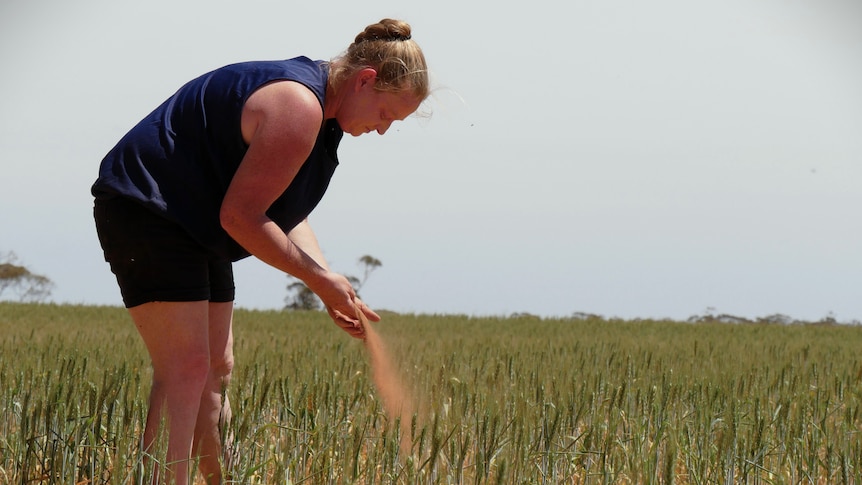Australia Weather News

Louise Smith's property has received less than half the average annual rainfall. (ABC Riverland: Amelia Walters)
Dusty paddocks, with no grain crop to harvest, and scarce feed for the few animals left.
That is the harsh reality at fourth-generation farmer Louise Smith's property at Maggea, 200 kilometres east of Adelaide.
Louise runs the farm alongside her brother Tim, and the pair hasn't harvested a crop to sell at market for the past two years.
"We don't have a continuous cash flow coming in, we'd probably be better off going on the dole knowing you've got a cheque coming in every two weeks," she said.
"Never have we seen it this bad and this dry ... it's a part of history I never want to be part of again."
Now entering their third harvest season fruitless, they have sold almost all of their cattle and have halved their flock of sheep.
It is a decision taking a heavy mental toll.
"Many nights I have just sat there trying to sleep, but I'm thinking about where the next lot of feed will come from or planning the next load of sheep or cattle to go," she said.
"We are just winging it day-to-day praying it all falls into line."
While some parts of South Australia are now expecting an average harvest after decent Spring rainfall, it is a different story for large parts of the Murraylands and Riverland region, which have not been so lucky.
"[If] we were relying on cereal crops [this season], I don't think we would be here ... I'm pretty sure we wouldn't be here actually," Louise said.
To get her farm and her family through, she has picked up extra work shearing sheep for farmers across the state.
She said it has been a lifeline for her financially and mentally.
"Going out to the shearing sheds has been a lifesaver for us because we're out talking to other farmers," she said.
Louise is just one of many women who are diversifying and trying to rise above the drought.
Healing through hardship
Suzie Evans is no stranger to isolation or prolonged drought conditions and knows more than most how hard life on the land can be.
She lost her son, Murray "Muzz" Chesser, to suicide seven years ago.
Through her grief, she found purpose and is now a mental health advocate, providing in-person workshops to those impacted by drought.
"We all have mental health, just like we have physical health," she said.
A 2023 report on the mental health of the country's farmers revealed that almost half have had thoughts of self-harm or suicide.
Suzie feared the "pressure to keep farms going" for generations would hold many back from seeking help, but she urged them to do so.
Capturing the impact
Kiara Fisher is witnessing the mental and financial burden of the drought from her fifth-generation Bugle Hut family farm.
She noticed many people living in metropolitan areas were unaware that drought was still an issue in SA.
To try and raise national awareness online and bring the community together, she founded 'A Farmer's Plate' — a storytelling social media project.
"We want to achieve understanding, compassion and education of the general public," she said.
"I hope the general public will then have conversations with people that can help make change, so when [farmers] ask for help, they know they truly need it."
To capture the raw reality of people on the land, she connected with Riverland photographer and farmer's wife Rebecca Flack.
"I like to share the real elements of what we're going through with the drought," Rebecca said.
"Some of those pictures are quite graphic of animals, who unfortunately passed away, but that's a real visual."
The duo said they have had an "overwhelming response".
"It's been comforting seeing farmers realise they're not the only ones going through a tough time and we are experiencing similar conditions," Rebecca said.
"We're all in this together. There is no such thing as a bad farmer."
Misconceptions of drought
These four rural women are all stepping up in their own way to highlight the challenges of farming in drought.
But they all agreed, the best support farmers could receive was understanding from people outside of their communities.
Louise wants people to understand that some rain won't break a drought, and owning a farm does not always equate to wealth.
"A lot of city people think it's rained statewide, but there are still patches of the state that are struggling pretty badly," she said.
Kiara agreed and said she was disappointed by the government's lack of understanding of what assistance would effectively help farmers through the drought.
"I think most farmers will say that their neighbours have done more for them this season than the government ever will," she said.
"The drought packages, look great on paper but for most people, spending money to get money back from the government is not a position they are in."
Minister for Primary Industries and Regional Development, Clare Scriven, said there has been "strong uptake" of the State Government’s drought support package with "just over $70 million distributed".
"More than 3,600 producers have been approved for money to assist them purchase equipment and other infrastructure ... including 749 producers in the Riverland, Murray and Mallee regions," she said in a statement.
For Suzie Evans, she hopes more farmers can take that first step to seek support, even if it is just from a neighbour.
"We all need support, and we are all in this together; it's not a competition," she said.
"Believe in yourself because you're stronger than you think."
ABC